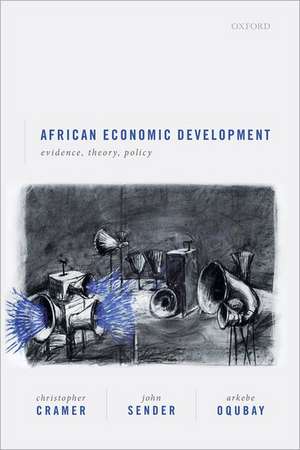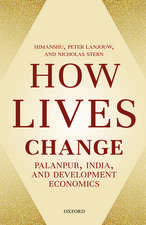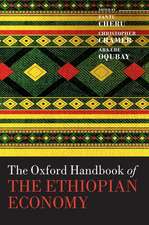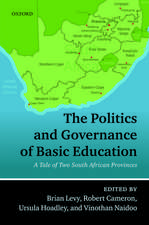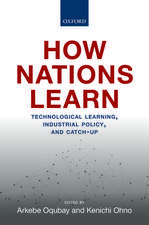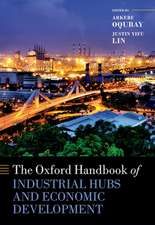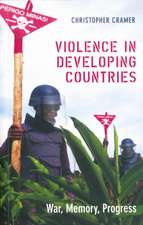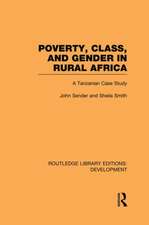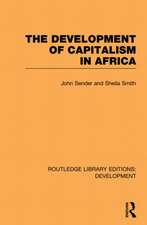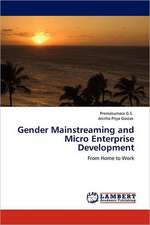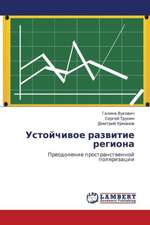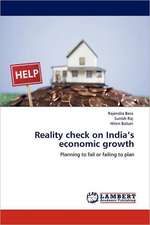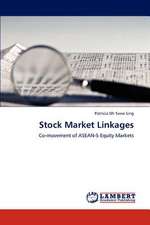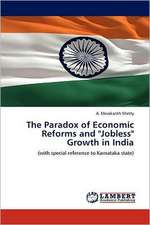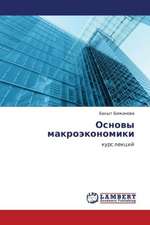African Economic Development: Evidence, Theory, Policy
Autor Christopher Cramer, John Sender, Arkebe Oqubayen Limba Engleză Hardback – 11 iun 2020
Preț: 348.77 lei
Preț vechi: 393.74 lei
-11% Nou
Puncte Express: 523
Preț estimativ în valută:
66.74€ • 72.48$ • 56.07£
66.74€ • 72.48$ • 56.07£
Carte disponibilă
Livrare economică 21-27 martie
Preluare comenzi: 021 569.72.76
Specificații
ISBN-13: 9780198832331
ISBN-10: 0198832338
Pagini: 336
Dimensiuni: 164 x 241 x 25 mm
Greutate: 0.67 kg
Editura: OUP OXFORD
Colecția OUP Oxford
Locul publicării:Oxford, United Kingdom
ISBN-10: 0198832338
Pagini: 336
Dimensiuni: 164 x 241 x 25 mm
Greutate: 0.67 kg
Editura: OUP OXFORD
Colecția OUP Oxford
Locul publicării:Oxford, United Kingdom
Recenzii
The text offers much to consider regarding the policy decisions still needed for development in African countries.
Examines conventional wisdom about economic performance and possible policies for economic development in African countries, highlighting differences between and within countries around distinctions of gender, class, and ethnic identity.
It is many years since the subject of African economic development has been treated with the best insights and methods that modern social science has to offer. Cramer, Sender, and Oqubay have set a new standard in this respect.
they clearly argue that successful development must be state-led and evidence-driven, while both the optimal mix and the possible mixes of state and private sector actors vary not only by country but by sector, and by other contingent factors. The book was written prior to the current Covid-19 pandemic, but their call for adapting policy to evidence and to unexpected changes remains just as relevant, if not more relevant, in the period ahead.
... if this book were read and acted upon, prospects for development economics and for economic development for Africa would be significantly brighter.
This is a stunningly good book: historically grounded, rich with evidence and examples, skeptical of the conventional wisdom, and infused with a realistic 'bias for hope' that counters the over-pessimistic and over-optimistic analyses of many far less thoughtful writers. Read it and be inspired.
Somewhere between a bird's eye view of Africa's development dilemmas and a pragmatic assessment of the intricacies of policy making the authors of this book found a superb niche: to guide us through what is essential because it is often different from the common views. A masterful undertaking that will become essential reading for African policy makers eager to deepen their thoughts.
Cramer, Sender and Arkebe do an excellent job of looking at the theories of economic development from a refreshing perspective. And I highly welcome their belief in African policymakers to make good decisions when presented with robust evidence. Development practitioners around the world will benefit immensely from this book, as it challenges accepted economic theory, while providing intriguing alternatives.
African policy makers generally struggle to find evidence to support initiatives they would like to pursue. Pressure on them to find such evidence has grown as the number of 'stakeholders' interested in the outcomes has grown. This book on economic development in Africa is designed to help them in their pursuit of what is good economics, relevant and more easily manageable. It is a great complement to the recent volumes on African development, offering a refreshingly different approach that appeals to common sense and the new realities of the region.
In this remarkable book, Cramer, Sender, and Oqubay present a view of Africa unlike anything we have seen. Facing head on the brutality of capitalism in Africa - as elsewhere - they show how nonetheless it has brought about significant, if uneven, progress in human welfare. Analysing trends in structural transformation, they never lose sight of the welfare of ordinary people. Acknowledging the weight of history, they show how a country's prospects are mainly shaped by what a country does, not what it is and has. They offer realistic optimism for a continent where policies have too often been crippled by fatalism. It is one of those very rare books that make you see the world differently after you have read it.
Cramer, Sender and Oqubay offer us in this book not only their deep knowledge of African economies and their challenges -with their inherent diversity-, but also of other development experiences. Based on the evidence that these experiences provide, as well as an interdisciplinary framework, they put forwards an ambitious agenda for investment and structural change for African development that overcomes the over-pessimism but also the over-optimism of many alternative proposals.
Africa is a fascinating continent, and this superb book provides the depth of insight that is often missing in other commentary which tends to the extremes of pessimism or over-optimism based on simplistic notions of how economies function and evolve
Arguing against both 'African pessimism' and the naïve optimism of 'Africa rising', this innovative book makes the case for 'possibilism'. This is not just another economics textbook on Africa: it is deeply interdisciplinary and draws not only on history, politics, anthropology, and soil science, but strikingly too on the world of art and literature. The authors offer an unmistakeably progressive political economy, unafraid to challenge weak arguments of radical 'left' economists as much as the worn-out narratives of the mainstream.
Examines conventional wisdom about economic performance and possible policies for economic development in African countries, highlighting differences between and within countries around distinctions of gender, class, and ethnic identity.
It is many years since the subject of African economic development has been treated with the best insights and methods that modern social science has to offer. Cramer, Sender, and Oqubay have set a new standard in this respect.
they clearly argue that successful development must be state-led and evidence-driven, while both the optimal mix and the possible mixes of state and private sector actors vary not only by country but by sector, and by other contingent factors. The book was written prior to the current Covid-19 pandemic, but their call for adapting policy to evidence and to unexpected changes remains just as relevant, if not more relevant, in the period ahead.
... if this book were read and acted upon, prospects for development economics and for economic development for Africa would be significantly brighter.
This is a stunningly good book: historically grounded, rich with evidence and examples, skeptical of the conventional wisdom, and infused with a realistic 'bias for hope' that counters the over-pessimistic and over-optimistic analyses of many far less thoughtful writers. Read it and be inspired.
Somewhere between a bird's eye view of Africa's development dilemmas and a pragmatic assessment of the intricacies of policy making the authors of this book found a superb niche: to guide us through what is essential because it is often different from the common views. A masterful undertaking that will become essential reading for African policy makers eager to deepen their thoughts.
Cramer, Sender and Arkebe do an excellent job of looking at the theories of economic development from a refreshing perspective. And I highly welcome their belief in African policymakers to make good decisions when presented with robust evidence. Development practitioners around the world will benefit immensely from this book, as it challenges accepted economic theory, while providing intriguing alternatives.
African policy makers generally struggle to find evidence to support initiatives they would like to pursue. Pressure on them to find such evidence has grown as the number of 'stakeholders' interested in the outcomes has grown. This book on economic development in Africa is designed to help them in their pursuit of what is good economics, relevant and more easily manageable. It is a great complement to the recent volumes on African development, offering a refreshingly different approach that appeals to common sense and the new realities of the region.
In this remarkable book, Cramer, Sender, and Oqubay present a view of Africa unlike anything we have seen. Facing head on the brutality of capitalism in Africa - as elsewhere - they show how nonetheless it has brought about significant, if uneven, progress in human welfare. Analysing trends in structural transformation, they never lose sight of the welfare of ordinary people. Acknowledging the weight of history, they show how a country's prospects are mainly shaped by what a country does, not what it is and has. They offer realistic optimism for a continent where policies have too often been crippled by fatalism. It is one of those very rare books that make you see the world differently after you have read it.
Cramer, Sender and Oqubay offer us in this book not only their deep knowledge of African economies and their challenges -with their inherent diversity-, but also of other development experiences. Based on the evidence that these experiences provide, as well as an interdisciplinary framework, they put forwards an ambitious agenda for investment and structural change for African development that overcomes the over-pessimism but also the over-optimism of many alternative proposals.
Africa is a fascinating continent, and this superb book provides the depth of insight that is often missing in other commentary which tends to the extremes of pessimism or over-optimism based on simplistic notions of how economies function and evolve
Arguing against both 'African pessimism' and the naïve optimism of 'Africa rising', this innovative book makes the case for 'possibilism'. This is not just another economics textbook on Africa: it is deeply interdisciplinary and draws not only on history, politics, anthropology, and soil science, but strikingly too on the world of art and literature. The authors offer an unmistakeably progressive political economy, unafraid to challenge weak arguments of radical 'left' economists as much as the worn-out narratives of the mainstream.
Notă biografică
Christopher Cramer is Professor of the Political Economy of Development at SOAS, University of London. He is a vice-chair of the Royal African Society, a Fellow of the Academy of Social Sciences, and chairs the Scientific Committee of the African Programme on Rethinking Development Economics based in South Africa. He is the author of Civil War is Not a Stupid Thing: Accounting for Violence in Developing Countries (2006, C. Hurst) and worked on the Fairtrade, Employment, and Poverty Reduction in Ethiopia and Uganda research project funded by the UK Department for International Development. He co-edited The Oxford Handbook of the Ethiopian Economy (2019, OUP) and The Oxford Handbook on Industrial Policy (2020, OUP).John Sender is an Emeritus Professor of Economics, SOAS, University of London. He began rural fieldwork in the 1970s, while working at the University of Dar es Salaam. Later jobs included: Director of the African Studies Centre, University of Cambridge; Visiting Professor of Political Economy, Witwatersrand University; Senior Research Fellow, African Studies Centre, Leiden. He advised Mandela's Presidential Commissions on Labour and on Rural Credit; Economic Commission for Africa; Federal Government of Nigeria and Federal Democratic Republic of Ethiopia; and he has worked with the Governments of Mozambique, Uganda, Sri Lanka and Vietnam. Early books include: Imperialism (1980, Verso); The Development of Capitalism in Africa (2010, Routledge); Poverty Class and Gender in Africa (2012, Routledge). Many journals publish his work, including: Feminist Economics, Journal of Economic Perspectives, World Development, Cambridge Journal of Economics, and African Affairs.Arkebe Oqubay is a Senior Minister and Special Adviser to the Prime Minister of Ethiopia and has been at the centre of policymaking for over twenty-five years.He is an ODI Distinguished Fellow and holds a PhD in development studies from SOAS, University of London. He is the former mayor of Addis Ababa and winner of the ABN Best African Mayor of 2006, and finalist for the World Mayor Award 2006, for transforming the city. He is a recipient of the Order of the Rising Sun, Gold and Silver Star. His work includesMade in Africa (2015, OUP); How Nations Learn (2019, OUP); The Oxford Handbook of the Ethiopian Economy (2019, OUP); China-Africa and an Economic Transformation (2019, OUP); The Oxford Handbook of Industrial Hubs and Economic Development (2020, OUP); and The Oxford Handbook of Industrial Policy (2020, OUP). He was recognized as one of the 100 Most Influential Africans of 2016, and a 'leading thinker on Africa's strategic development' by the NewAfrican.
